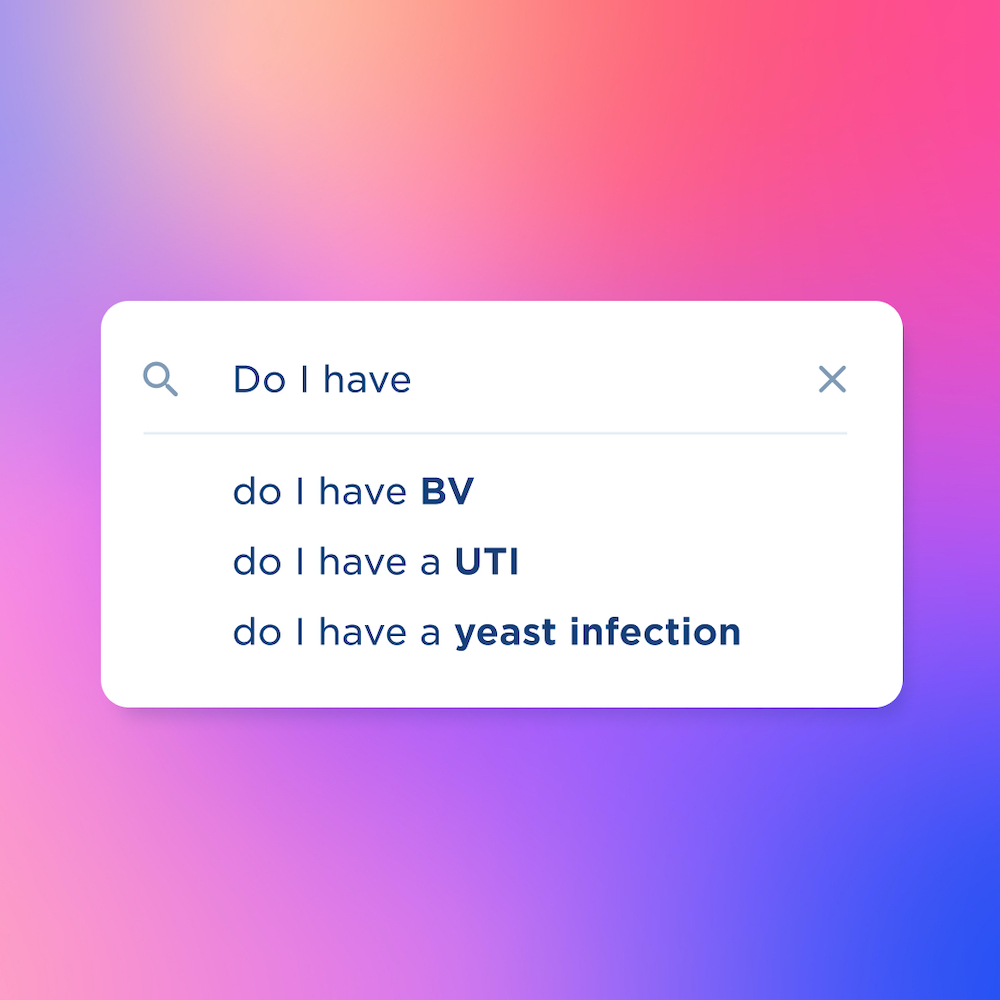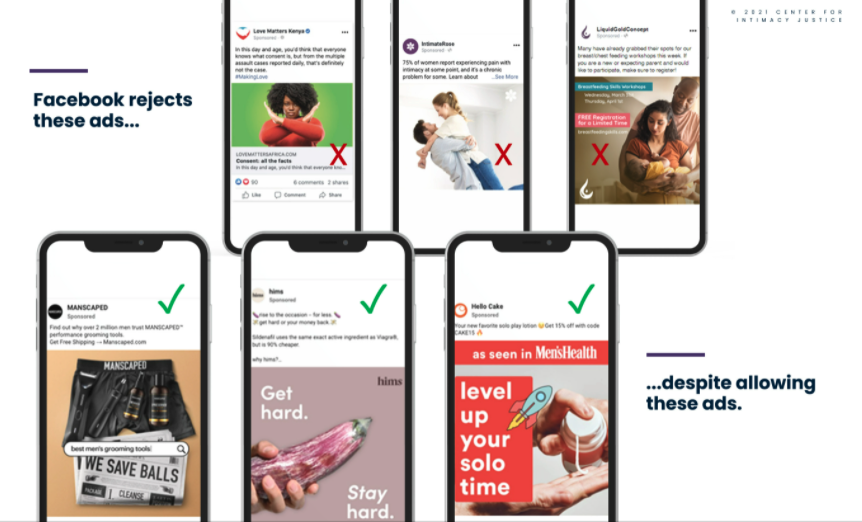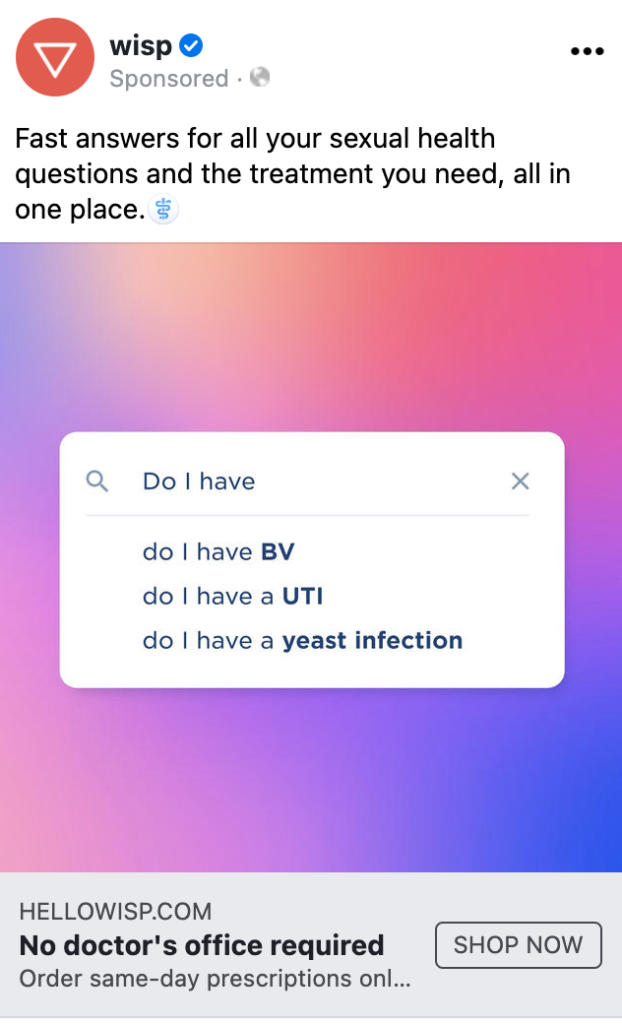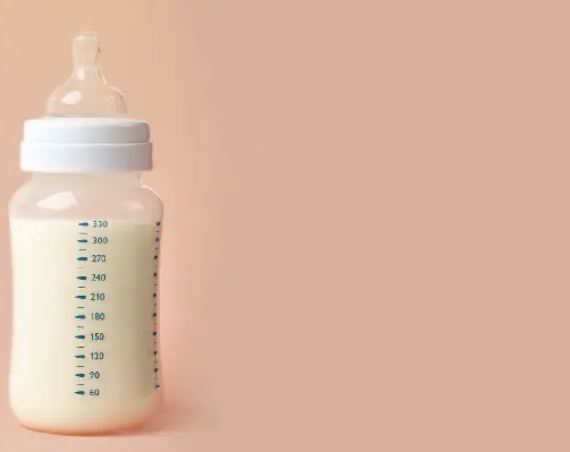
About two weeks ago the femtech world was in uproar yet again as the New York Times article “Why did Facebook reject those ads?” brought attention to the difficulties around advertising faced by many companies in the women’s and sexual health space. This most recent discussion was triggered by a new report released by the Center for Intimacy Justice (CIJ), a nonprofit and social change organization committed to equity and wellbeing in people’s intimate lives, that investigated the curious case of blocked ads on Facebook, Instagram & Co.
The report titled “Facebook’s Censorship of Health Ads for Women and People of Diverse Genders” surveyed 60 health businesses that attempted to advertise on Facebook and found that 100% of respondents had experienced Facebook rejecting an advertisement, and 50% of respondents had their advertising accounts suspended at some point. Most commonly Facebook classified the rejected ads as “Adult Products & Services”.
What is most striking when reading through the report are the examples given about “what goes and what doesn’t” when comparing ads from companies targeting women’s health and men’s health. 👇

The new report quantifies, what many founders in the our space have anecdotally shared in posts and on panels over the past couple of years and the question we ask now is an obvious one: What’s next?
According to a statement by Center of Intimacy Justice Founder Jackie Rotman who led the investigation, since the release of the report “dozens more businesses who’ve experienced social media censorship of their advertisements” have come forward and the CIJ is currently “expanding the data (they) have available and gathering more responses” with plans to “strategically speak to Facebook”.
We’ll pay close attention to the next steps and outcome of these talks, but in the meanwhile, the struggle continues for those in our space relying on paid ads as a strong channel to create awareness, build brand and attract customers.
Unless the founder runs a women’s health startup… 🙈🙊 #femtech #advertisingban https://t.co/s1rlnwrvuX
— Femtech Insider (@femtechinsider) January 21, 2022
Among those who paid close attention, when the report was released a few weeks ago, was Jennifer Dwork, Head of Brand Marketing at wisp, a U.S. based telehealth company that provides an “easy, accessible and more satisfying sexual healthcare experience, through a budget friendly e-pharmacy and trusted virtual care.”
Jennifer Dwork, like many other marketers in our space, has been on the receiving end of the “advertising bans” for a while now and as a broader conversation with Meta is getting started, women’s health and sexual wellness brands continue to operate in this less than optimal environment, where ads like the ones below shared by wisp get banned on Instagram, TikTok & Co.
So what’s it actually like to build brand and create demand for sexual health & wellness solutions these days? In our interview wisp’s Jennifer Dwork shared some insights on her “daily quest for ad approvals”, brand strategy, and day-to-day advertising operations. How do the restrictions impact wisp as a business? Let’s find out! 👇
An Interview with Jennifer Dwork, wisp’s Head of Brand Marketing
What has been your overall experience with online advertising at wisp?
Digital advertising at wisp has been far more complicated and nuanced than at my previous companies, where I sold books and shoes online. There’s no doubt that checks and safety guidelines are a necessary part of online healthcare marketing, but we still face ad rejections almost every week despite taking a number of steps to prove our legitimacy and safety.
We’ve seen rejections for using the words “vaginal care” in ad copy, paired with both lifestyle imagery and product shots of common OTC and prescription treatments. There also appears to be inconsistency among what conditions we can directly name in ads, i.e. bacterial vaginosis, yeast infections, UTIs, herpes. We’ve also had our Instagram account shut down without clear explanation or warning.
Each advertising platform has its own unique policies and processes for reviewing ads. I’ve had to work much more closely with our account reps, more so than at retail companies, to push through approvals for ads and to understand what might be causing these rejections. Unfortunately, our reps often seem to be as “in the dark” as we are in understanding content disapprovals.
Have you ever reached out to any of the companies about the banned ads? Was there a response and what was it?
Facebook has a process where you can apply as an approved telehealth provider. We’ve gone through this process and been approved, however, Facebook continues to reject certain ads at random, citing reasons such as, “Ads may not promote prescription drugs without prior written permission.”
We have an account rep who we reach out to when our ads are rejected. The rep can usually take care of the rejections for us, but this takes time, which is a valuable resource at any company—particularly at a startup like ours.
It’s been reported that Facebook claims the majority of ad rejections from companies like ours are deemed to be a mistake. However, I have never heard of any actions they are taking to help reduce these mistake rejections that keep happening.
Why do you think women’s health and sexual health companies that serve women are struggling to get their ads approved?
I think that the shift to online care has happened faster than big tech companies, like Facebook and Google, have kept pace with. It’s possible that connecting users with healthcare alternatives is not something these platforms are prioritizing or even comfortable with at the moment. For example, it seems like Facebook’s ad-review process for regulated industries like healthcare does not distinguish between approved advertisers and what they deem “explicit” content. It’s not surprising that sexual healthcare—with its mention of different body parts, conditions, and treatments—is one of the categories met with the most rejections.
In what ways do ad bans impact your business?
100% of our marketing efforts are predicated on understanding and maintaining compliance standards to serve our users’ needs and avoid platform dissapprovals. In a startup environment, new initiatives and ideas need to be proven quickly so we know where to leverage resources. But having a start and stop cadence when it comes to launching ads delays these learnings and moves things into a reactive state where the focus is on navigating a complex algorithm instead of understanding user engagement.
It can also be a block to our team’s creativity. We’ll often have an internal brainstorming session, and someone on the team will ask, “won’t Facebook reject this?” The answer is “we don’t know!” It becomes a source of anxiety, not to mention a waste of money, when you think that an ad is launched, only to log in and find that it’s just sitting in a state of disapproval without clear explanation.
With difficulties advertising on Facebook, Instagram & co, what are some other ways you’ve found to reach potential customers?
We’ve found that our ads tend to get approved much more seamlessly on Snapchat and TikTok, which makes planning and launching campaigns less stressful. We’ve also been working with content creators who are passionate about access to sexual healthcare, destigmatization around these very common conditions, and overall promotion of healthcare alternatives—these campaigns have worked well for us. In fact, we often use this content for our paid ads, and they tend to perform very well (once approved!) because of the enthusiasm these creators have for wisp. The affiliate channel has also been quite strong for us in general—bloggers and content creators who have engaged audiences promote wisp in a trustworthy and authentic way.
The recently published report on advertising bans is a first step to creating more awareness for the problems companies in our space face. What do you think can be or should be next steps?
The fact that the media is paying attention to this issue is a start! A broader conversation here should help bring attention to the importance of providing clear ad guidelines and approval processes across platforms. Wisp, and many other companies in this space, exist to give folks access to care who may not be getting the treatment they need under our traditional healthcare system. So I think that the conversation should continue, and hopefully some of these platforms will prioritize reevaluating their existing policies or methods for reviewing ads – perhaps adding in more of a human element to their review – to keep pace with this rapidly changing landscape.





